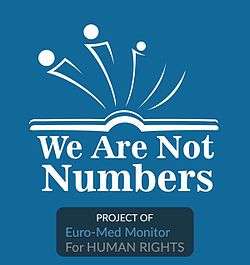We Are Not Numbers
We Are Not Numbers is a project for young adults in the Gaza Strip designed both to help them share their narratives (and those of their people) in their own words with the Western (English-speaking) world and bust stereotypes about Palestinians. Founded in 2015 by American journalist Pam Bailey under the umbrella of the Euro-Mediterranean Human Rights Monitor[1][2][3][4], a Geneva-based organization chaired by Dr. Ramy Abdu[5][6], the project aims at training young youth to write about life in a conflict-ridden area following Israel's operation Protective Edge on the Gaza Strip. It operates by pairing developing English writers in Gaza (ranging in age from 15 to about 30) with professional authors/reporters/communicators, who mentor them on both their language and storytelling skills. Their essays, poems, features and news reports (as well as videos) are published on the project website, its social media channels and via external outlets such as Mondoweiss[4][1], the New Arab +972 magazine.
| We Are Not Numbers | |
|---|---|
 | |
| Commercial? | No |
| Type of project | Media |
| Location | Gaza Strip |
| Owner | We Are Not Numbers |
| Founder | Pam Bailey |
| Established | February 2015 |
| Website | wearenotnumbers |
Currently, We Are Not Numbers operates as an independent project with fiscal sponsorship from Nonviolence International in the United States.
References
- Monitor, Euro-Med. "'Not Numbers' writers partner with mentors to tell their stories to the world". Euro-Mid. Retrieved 2019-07-12.
- Monitor, Euro-Mediterranean Human Rights. "We Are Not Numbers". Euro-Mid. Retrieved 2019-07-12.
- Monitor, Euro-Mediterranean Human Rights. "Euro-Mediterranean Human Rights Monitor". Euro-Mediterranean Human Rights Monitor. Retrieved 2019-07-12.
- "'We Are Not Numbers' welcomes new class of 24 young writers in Gaza". Mondoweiss. 2016-02-19. Retrieved 2019-07-12.
- "We Are Not Numbers || About Us". wearenotnumbers.org. Retrieved 2019-07-12.
- Monitor, Euro-Mediterranean Human Rights. "Euro-Mediterranean Human Rights Monitor". Euro-Mediterranean Human Rights Monitor. Retrieved 2019-07-12.